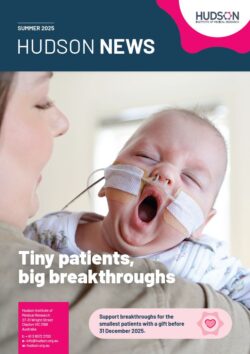Dr Daniel Garama, Lead, Next Generation PDT Program and Head of Proteomics
- Research Scientist, Signal Transduction in Cancer Biology
- daniel.garama@hudson.org.au
Dr Daniel Garama is the Lead Researcher for the Next Generation PDT Program, which utilises naturally derived Next Generation Photodynamic Therapy (NG-PDT) compounds to target and kill tumour cells with the aim to revolutionise cancer treatment and patient outcomes both here in Australia and Worldwide.

Areas of interest
Blood cancer Inflammation and cancer Lung cancer Ovarian cancer Pancreatic cancer
Research group
Signal Transduction in Cancer Biology
Biography
Dr Daniel Garama is a first nations clinical biochemist with expertise in cancer, proteomics, drug development and mitochondrial biology. He is Principal Investigator of the Next Generation PDT Program at Hudson Institute of Medical Research developing new and novel cancer drugs and leads a team looking at protein mitochondrial biogenesis in disease states.
He is also heads proteomics platform at Hudson Institute, facilitating staff and collaborating on specialist proteomic analysis for many researchers both nationally and internationally. He actively promotes and mentors young indigenous scientific and clinical research students and works closely with community and government organisations to promote and facilitate first nations health.
Dr Garama is a council member of the Health Research Council and Human Proteasome Organisation HUPO. He has strong involvement in industry and commercial research and is an adviser at INVION, RMW Cho, Mass Dynamics and NTRC on a range of commercial projects. He also holds the role of Chief Scientific Officer at ImmunoPDT, a commercial start-up company developing cancer drugs and undertaking clinical trials to help provide better outcomes for patients with deadly cancers.
Next Generation PDT program developing new non-invasive cancer treatments
There is a desperate need for improved and less invasive treatments for cancers. Dr Daniel Garama and his research team have developed naturally derived Next Generation Photodynamic Therapy (NG-PDT) compounds that are able to target and kill tumour cells in melanoma, ovarian cancer, lung cancer, blood cancer, prostate cancer and pancreatic cancer, in both invitro and pre-clinical models, and also clinically in melanoma.
This collaborative program supported by RMW Cho has led to the development of a next generation Photodynamic Therapy Photodynamic drug that uses far UV light and kill tumour cells via oxygen generation. These next generation targeted drugs offer a new and non-invasive approach to cancer, with the hope to revolutionise cancer treatment and patient outcomes both here in Australia and Worldwide.
RMW Cho is a key partner in this program, their passion for wanting new cancer treatments for a better world has been inspiring and lead to us developing these new exciting compounds. RMW Cho have been able to bring together key academic and industry partners to ensure this research programme moves forward freely with all necessary support. Advanced molecular Technologies (Medicinal Chemistry), AB technologies (Light Technologies) and Invion (Commercialisation).
These compounds have been developed, tested and produced locally in Victora, and are 100 per cent Australian Made and 100 per cent a product of Australian Research. These developed NG-PDT compounds have greatly increased stability, selectivity, potency and to date are the best compounds discovered.
The next step is to move into clinical trial stages using these NG-PDT compounds with the aim of developing new non-invasive cancer treatment pathways for some of the deadliest cancers.
Research Team | Dr Daniel Garama, Lethicia Low
Team Alumni | Luhith Dimantha, Anurag Yadav, Grace Liu, Finn Rennie
Affiliates | Scott Carpenter, Professor Robert Ramsay, Dr Sebastian Marcuccio, Alex Bennett, Dr Donald Murphy, Professor Thian Chew
Student opportunities

Publication highlights


